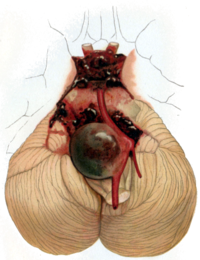
Photo from wikipedia
In patients with aneurysmal subarachnoid hemorrhage (aSAH) unfavorable for endovascular or traditional open surgical techniques, surgical revascularization strategies comprise one of remaining limited options. There is nonetheless a paucity of… Click to show full abstract
In patients with aneurysmal subarachnoid hemorrhage (aSAH) unfavorable for endovascular or traditional open surgical techniques, surgical revascularization strategies comprise one of remaining limited options. There is nonetheless a paucity of data on the safety and efficacy of bypass in aSAH. In this study, we aimed to investigate complications and outcomes in a cohort of patients with aSAH treated with bypass. A prospective single-surgeon database of consecutive patients treated for aSAH between 2013 and 2018 was retrospectively analyzed. Complications and functional status at discharge were recorded and analyzed for the patients that underwent bypass surgery. Forty patients with aSAH were treated with bypass surgery (23 extracranial-intracranial; 17 intracranial-intracranial). All-cause perioperative mortality was 13% (6 patients). At discharge and at mean 14-month follow up, respectively, 16/40 (40%) and 16/25 (64%) of patients achieved a Glasgow Outcome Score of 4-5. All-cause, in-hospital complications occurred in 28 patients (70%), of which any ischemic complication occurred in 20 patients (50%), 7 (18%) being open surgical complications. This work represents the largest modern series of bypass for aSAH to date. In cases of aSAH unfavorable for endovascular intervention or traditional open surgical techniques, bypass remains a viable option in this complex group of patients.
Journal Title: Journal of Clinical Neuroscience
Year Published: 2021
Link to full text (if available)
Share on Social Media: Sign Up to like & get
recommendations!